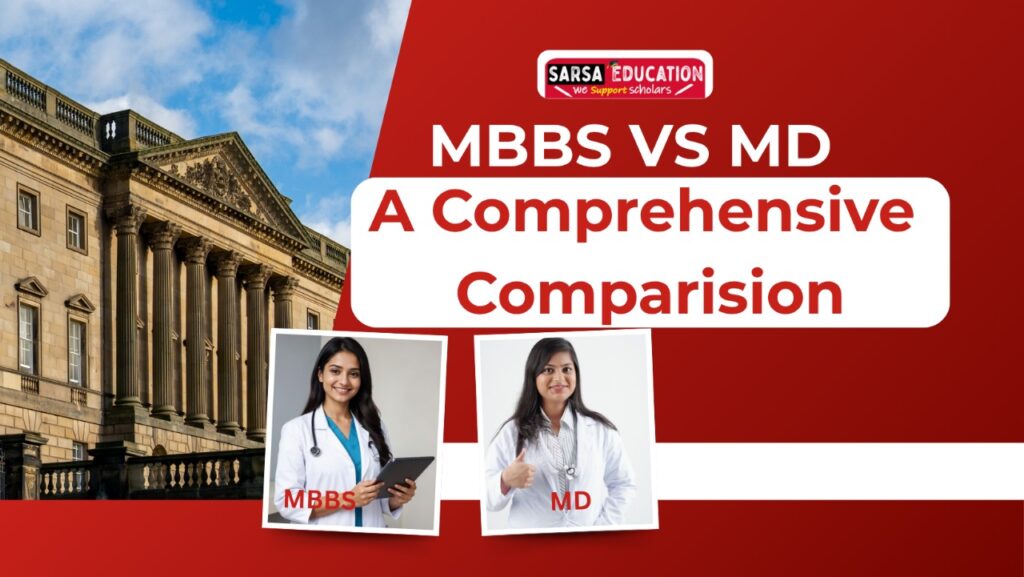MBBS Vs MD :A Comprehensive Comparision An MBBS stands for Bachelor of Medicine, Bachelor of Surgery (Latin: Medicinae Baccalaureus, Baccalaureus Chirurgiae). It’s the foundational undergraduate degree for becoming a doctor in many Commonwealth countries, including India. An MBBS is a rigorous 5.5-year undergraduate medical degree combining medicine and surgery, followed by hands-on clinical training. It’s your gateway to becoming a licensed doctor and provides the foundation to further specialize if desired.
An MD (Doctor of Medicine) is a postgraduate medical degree pursued after completing an MBBS (or equivalent). It provides advanced clinical expertise, specialization, and research training. Here’s a detailed overview. An MD is a post-MBBS specialist medical degree, typically 2–3 years long in countries like India, offering advanced clinical focus and research exposure. In North America, it’s the foundational medical qualification requiring 4 years of study followed by residency. It’s essential for becoming a specialist physician or pursuing a career in clinical research and academia.
What Does the MBBS Program Involve?
- Duration: Typically 5.5 years—4.5 years of academics plus a 1-year compulsory rotating internship (CRMI) in hospitals .
- Curriculum Phases:
- Pre‑clinical: Anatomy, Physiology, Biochemistry
- Para‑clinical: Pathology, Microbiology, Pharmacology, Forensic & Community Medicine
- Clinical: Medicine, Surgery, Obstetrics & Gynecology, Pediatrics, Psychiatry, and more .
- Internship (CRMI): Students rotate through key departments, develop practical and patient-management skills, and operate under supervision to qualify for medical registration
Contents
Duration of MBBS VS MD
The duration of MBBS vs MD is mentioned below:
The MBBS program spans a total of 5½ years whereas the MD Program is of 6 Years.
Is MBBS equal to MD(MBBS vs MD)?
MBBS (Bachelor of Medicine, Bachelor of Surgery) is an undergraduate medical degree in countries following the British system (India, UK, Australia, Pakistan, etc.) — typically 5–6 years, including internship.
MD (Doctor of Medicine) carries different meanings across countries:
| Country/System | MD Definition |
|---|---|
| India, UK, Commonwealth | A postgraduate degree pursued after MBBS; specialization in fields like Internal Medicine (3 years) |
| USA / Canada | A primary medical degree, a 4‑year graduate program after a bachelor’s degree, followed by 3–7 years of residency |
| Australia | Some universities have shifted from MBBS to an MD as a graduate-entry master’s-level degree, but both qualify for medical practice |
So Are They Equal (MBBS vs MD)?
- In India/Commonwealth:
- MBBS = Undergraduate qualification to become a general practitioner.
- MD = Postgraduate specialization.
They are not equivalent: MBBS is the foundation, and MD is advanced training .
- In the USA/Canada:
- MBBS (or MBChB) is considered equivalent to the MD degree, meaning it matches the level of the US MD, provided foreign graduates pass licensure exams.
- Terminology Confusion:
On Reddit, one user explained: “in UK‑style MBBS countries you can also earn an MD which is technically a post‑graduate degree … Someone with MBBS can work independently … MD in India is the post graduate degree.” Another added: “Once you’re ECFMG certified you can call yourself MD” when practicing in the US
- MBBS ≠ MD in India/Commonwealth — MBBS is the basic qualification, and MD is a further specialization.
- MBBS = MD in countries using US-style medical degrees (e.g., USA, Canada), after passing licensure (e.g., USMLE).
Important link:
- Top Scholarships after 12th for Arts, Science & Commerce
- Top 100 Scholarships for B.Com students.
- Top Scholarship for Engineering Students
- Top 100 Scholarships for B.Sc students.
MBBS vs MD Key Differences
Here’s a clear comparison of MBBS vs. MD, highlighting how they differ across educational levels, purpose, and career pathways:
1. Degree Level & Purpose
- MBBS is an undergraduate medical degree (typically 5–6 years) designed to qualify students as general practitioners .
- MD varies based on country:
- In India, UK (Commonwealth): it’s a postgraduate (master’s/research) degree pursued after MBBS for specialization or academic research .
- In USA/Canada: it’s the primary graduate-entry professional medical degree (also ~4 years after undergrad) .
2. Duration
- MBBS: 5–6 years including internship .
- MD:
- India: 2–3 years postgraduate specialist training .
- USA/Canada: 4 years medical school + 3–7 years residency .
3. Entry Requirements
- MBBS: entry post-high school (12th with PCM in India/Commonwealth) .
- MD:
- India: requires MBBS + internship + entrance exams (NEET-PG) .
- USA/Canada: requires a bachelor’s degree (pre-med courses) + MCAT + med-school admission .
4. Curriculum & Focus
- MBBS: Broad-based medical education covering foundational science, clinical rotations, and internship .
- MD (India): Intensive specialization in a chosen field (e.g., Pediatrics, Pathology), often includes thesis or research .
- MD (US/Canada): Broad professional training plus clinical work, preparing for residency in specialty .
5. Career Paths & Scope
- MBBS: Graduates become general practitioners, work in primary care, clinics, rural health, or seek postgraduate studies.
- MD (India): Becomes a specialist (e.g., Dermatologist, Anesthetist) with higher career potential .
- MD (US/Canada): After residency, one practices as a licensed physician with full clinical autonomy and further specialization .
6. Global Context
- In Commonwealth nations, MBBS is equivalent to the US MD regarding general qualification, even though naming differs
- In the UK/Australia, the UK-style MD is a research doctorate, taken after MBBS .
- Many foreign MBBS holders can enter US MD paths via ECFMG and residency
- MBBS = your foundational medical degree.
- MD (India/Commonwealth) = advanced specialization post-MBBS.
- MD (North America) = primary medical degree + eventual specialization during residency.
| Feature | MBBS (India/Commonwealth) | MD (India, Post‑MBBS) | MD (USA/Canada) |
|---|---|---|---|
| Degree Level | Undergraduate | Postgraduate | Graduate-entry professional |
| Duration | 5–6 years + internship | 2–3 years | 4 years + 3–7 years residency |
| Entry Requirements | 10+2 (PCM) + NEET-UG | MBBS + CRMI + NEET-PG | Bachelor’s + MCAT + med-school admission |
| Focus | General medical training | Specialized field training | General medicine + residency prep |
| Career Outcome | General practitioner | Specialist physician | Licensed MD physician |
MBBS vs. MD: Which is Better?
1. Starting Point Matters
- MBBS is your first professional degree – an undergraduate program spanning 5–6 years (including internship) that qualifies you to practice as a general physician .
- MD means different things depending on the country:
- In India/Commonwealth, it’s a postgraduate (specialist) degree—typically 2–3 years after MBBS .
- In the USA/Canada, it’s the primary medical qualification, post-undergrad, taking 4 years and followed by residency .
2. Depth vs Breadth
- MBBS gives you a broad clinical foundation—basic sciences and rotations across multiple specialties.
- MD (post-MBBS) focuses on deep specialization—complex case handling, research, advanced procedures .
- In the US, MD combines both general and specialty prep but always requires residency for full licensing.
3. Career & Scope
- With an MBBS, you can begin clinical work as a GP, join hospitals, or go for public health roles.
- With an MD (India), you’re recognized as a specialist—often drawing higher pay and handling advanced healthcare cases .
- In the US/Canada, an MD + residency leads to full-fledged practice as a licensed physician, often followed by sub-specialty training .
“With an MBBS alone you would mostly be working in primary care… Absolutely. In the current scenario, you are considered a reasonably successful doctor only if you have done a specialization and have an MD degree.”
4. Income & Recognition
- MBBS GP salary in India: ₹30 k–100 k/month; MD specialist salary: ₹90 k–180 k+ depending on field .
- Globally, specialists and US/Canada MD grads tend to earn more and are in higher demand .
What’s Better(MBBS vs MD)?
- If you’re finishing high school and eager to practice medicine soon, MBBS is your gateway.
- If you’re an MBBS graduate aiming for specialized expertise, MD is the logical next step.
- If your aim is to practice in North America, the MD route + residency is required.
| Goal / Situation | Recommended Path |
|---|---|
| Starting medical education post-12th | MBBS (5–6 yrs) |
| Want to specialize in India | MD (3 yrs after MBBS) |
| Want to practice in USA/Canada | Undergrad → MD (4 yrs) → Residency |
Eligibility for MBBS vs MD
Eligibility for MBBS
To be eligible for MBBS in India the candidate must meet the following requirements:
- The Candidate must have completed his/her 12th or equivalent examination with Physics, Chemistry, Biology/Biotechnology, and English as core subjects.
- The candidate must have scored a minimum aggregate marks required in the qualifying examination:
- General category: 50%
- OBC/SC/ST categories: 40%
- PwD candidates: 45%
- Candidates must be at least 17 years old by December 31, 2025.There is no upper age limit for appearing in NEET 2025
- Indian nationals, Non-Resident Indians (NRIs), Overseas Citizens of India (OCIs), Persons of Indian Origin (PIOs), and foreign nationals are eligible to apply.
Eligibilty for MD
To pursue an MD in Abroad as an Indian student in 2025, you must meet the following eligibility criteria:
- The Applicant must have completed 12th or equivalent education with Physics, Chemistry, Biology, and English as core subjects.
- The Applicant must have scored at least 50% aggregate marks in Physics, Chemistry, and Biology (PCB).
- Qualifying the National Eligibility cum Entrance Test (NEET) is compulsory for Indian students seeking admission to MBBS programs abroad, including Uzbekistan.
- A valid NEET scorecard from the current year or the previous two years is acceptable.
- The Applicant must be at least 17 years old by December 31 of the admission year.
Frequently Asked Questions
1.What is MBBS vs MD?
- MBBS is an undergraduate medical degree (5–6 years, incl. internship) that qualifies you as a practicing general physician.
- MD varies: in India/Commonwealth, it’s a 2–3-year postgraduate specialist degree; in the US/Canada, it’s a 4-year graduate-entry medical degree followed by residency .
2. Is MBBS equal to MD?
- No — MBBS is undergraduate; MD (India) is postgraduate specialization. In the US, MD is the primary medical degree .
3. Can an MBBS practice as a doctor?
- Yes. After the 5½-year course and internship, MBBS graduates can register and practice as general practitioners.
4. What is the Duration of MBBS vs MD?
The Duration of MBBS vs MD is given below:
- MBBS is 5–6 years total: 4–5.5 years of academic study + 1-year rotating internship.
- In India: 2–3 years postgraduate after MBBS .
- In the US/Canada: 4 years + 3–7 years residency .
5. What specializations are available in MD?
- MD post-MBBS: internal medicine, pediatrics, pathology, dermatology, etc. In US MD, all specialties require residency .
6. What’s the admission process of MBBS vs MD?
- MBBS: NEET-UG & 10+2 science required (India) .
- MD (India): NEET-PG after MBBS .
- MD (US): bachelor’s + MCAT + med-school apps .
7. Is an MD compulsory after MBBS?
- No. MBBS is sufficient for general practice; MD is optional specialization .
8. Which is more respected MBBS vs MD?
- MBBS prepares you for general practice; MD grants specialist recognition and higher esteem thereby more respected .
9. What are the salary differences MBBS vs MD?
- MBBS doctors in India: ₹6–7 LPA; MD specialists: ₹9–15 LPA+. In private/hospital settings, MD pays more .
10. What is the career path after MBBS vs MD?
- MBBS grads work as GPs, hospital officers, public health doctors, or pursue MD/MS .
- MD specialists practice in their field, work in hospitals or academia, and may pursue DM/DNB super-specializations .
11. What is the Global recognition of MBBS vs MD?
- Indian/Australian MBBS are recognized globally (e.g., ECFMG for the US). MD is also widely accepted .
12. Is US MD equivalent to Indian MBBS?
- Indian MBBS is equivalent to US MD in terms of general physician training, but US MD requires residency/licensing via USMLE .
13. Residency after MD in the US?
- Yes. After US MD, residency (3–7 years) is mandatory to practice independently.
16. What MD vs MS?
- MD focuses on non-surgical fields; MS (Master of Surgery) is for surgical specialization .
17. Can MD doctors perform surgery?
- In India, MD (non-surgical) cannot conduct surgeries; surgical MDs need MS or surgical super-specialty .
18. MBBS vs MD cost?
- MBBS fees vary (₹0.14 L–1 Cr); MD fees are ₹0.02–81 L depending on government/private institutions .
19. Research elements?
- MBBS includes basic study; MD often involves thesis/research, especially in countries like the UK and Australia .
20. Is MD necessary to be a “successful” doctor?
- In many urban settings, MD is seen as essential for credibility and specialization; MBBS often suffices in rural practice .
For National/International Scholarship updates kindly join our WhatsApp channel
Follow the Sarsa Education channel on WhatsApp: https://whatsapp.com/channel/0029VaL9SgRAjPXJthnK9D0E
In case of any queries, please reach out to:
+91-9156405182 (Monday to Friday – 10:00 AM to 06:00 PM (IST))
For regular Scholarship/Fellowship/Internship updates:
Join our Telegram channel: Sarsa Education







